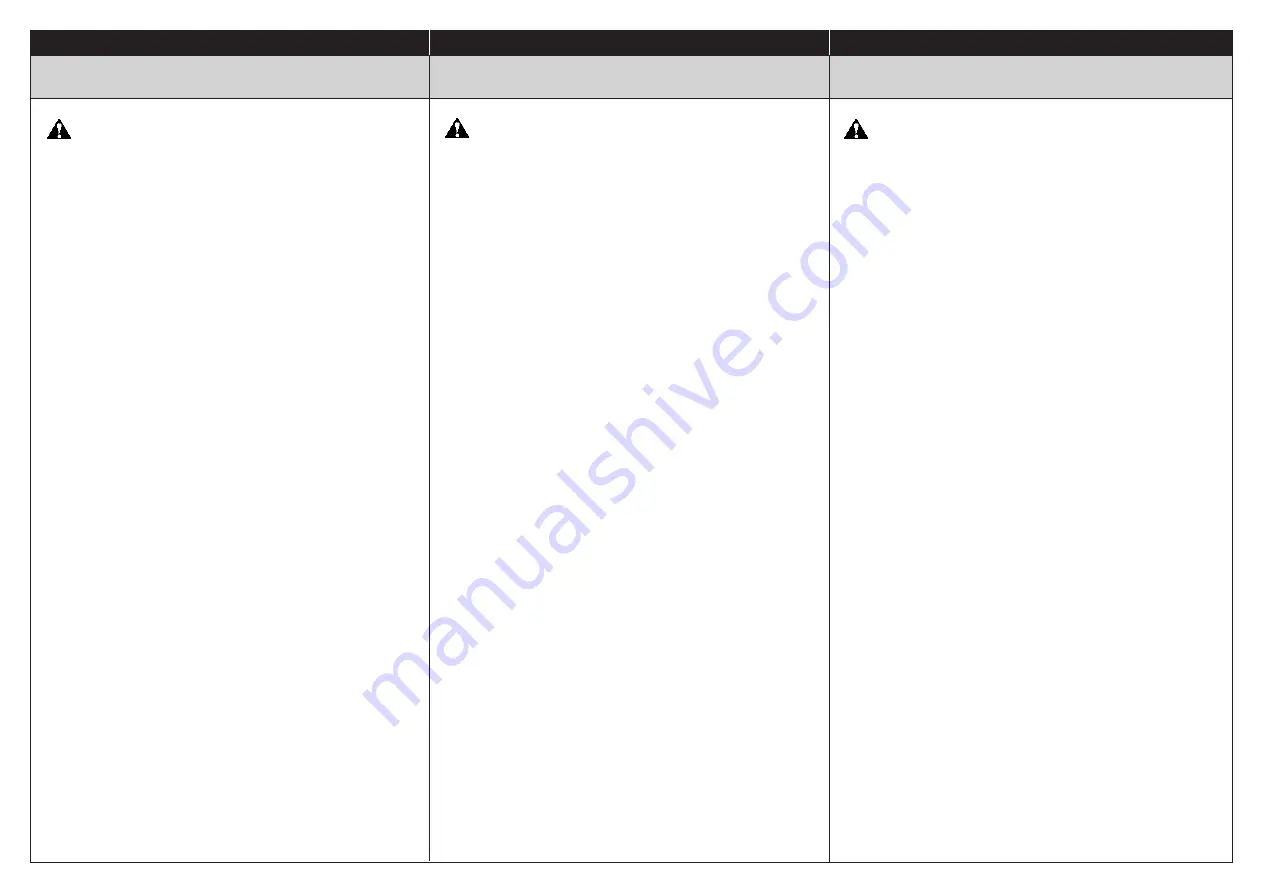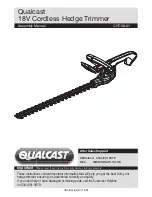
32
Italiano
Français
English
TEcNIchE dI lAvOrO
TEchNIquEs dE TrAvAIl
WOrkINg TEchNIquEs
ATTENZIONE: Non utilizzare mai l’unità
senza la protezione o con una protezione difettosa.
Non utilizzare mai l’unità senza l’albero di
trasmissione.
•
Non utilizzare i dischi per erba per abbattere fusti
legnosi.
•
Il disco per erba può essere utilizzato per tutti i tipi
di erba alta o erbaccia.
•
L’erba deve essere tagliata con movimenti alternati
laterali, in cui il movimento da destra a sinistra esegue
lo sfoltimento e il movimento da sinistra a destra è
la corsa di ritorno. Il taglio viene eseguito con il lato
sinistro del disco (
fig.36
).
•
Se il disco viene inclinato a sinistra durante lo
sfoltimento, l’erba cade lungo una linea e può essere
raccolta con maggiore facilità, ad esempio, con un
rastrello.
•
Cercare di procedere in maniera ritmica. Rimanere
saldamente fermi con le gambe leggermente
divaricate. Avanzare al termine della corsa di ritorno
e rimanere di nuovo saldamente fermi.
•
Lasciare che la coppa di supporto sfiori il terreno.
Serve a evitare che il disco tocchi il terreno.
•
Per ridurre il rischio di attorcigliamento di materiale
intorno al disco, attenersi alle seguenti istruzioni:
1. Tagliare sempre con il motore a pieno regime.
2. Evitare il materiale precedentemente tagliato
durante la corsa di ritorno.
•
Arrestare il motore, sganciare il cinghiaggio e
appoggiare l’unità a terra prima di iniziare a
raccogliere il materiale tagliato.
WArNINg: Never use the machine without
a guard or with a defective guard. Never use the
machine without the transmission shaft.
•
Grass blades and grass cutters must not be used on
woody stems.
•
A grass blade is used for all types of tall or coarse
grass.
•
The grass is cut down with a sideways, swinging
movement, where the movement from right-to-left
is the clearing stroke and the movement from left-
to-right is the return stroke. Let the left-hand side
of the blade do the cutting (
fig.36
).
•
If the blade is angled to the left when clearing grass,
the grass will collect in a line, which makes it easier
to collect, e.g. by raking.
•
Try to work rhythmically. Stand firmly with your
feet apart. Move forward after the return stroke and
stand firmly again.
•
Let the support cup rest lightly against the ground.
It is used to protect the blade from hitting the
ground.
•
Reduce the risk of material wrapping around the
blade by following these instructions:
1. Always work at full throttle.
2. Avoid the previously cut material during the
return stroke.
•
Stop the engine, unclip the harness and place the
machine on the ground before you start to collect
the cut material.
AvErTIssEmENT : N’utilisez jamais la
machine sans protection ou déflecteur. N’utilisez
jamais la machine sans l’arbre de transmission.
•
Les lames pour herbe et les coupe-herbe ne doivent
pas être utilisés pour la coupe de bois.
•
Les lames pour herbe s’utilisent pour tous les types
d’herbe, grande ou épaisse.
•
La coupe de l’herbe s’effectue suivant un mouvement
de balancement latéral, où le mouvement de droite
à gauche correspond à la coupe et le mouvement de
gauche à droite au retour de coupe. Effectuez le travail
de coupe avec le côté gauche de la lame (
fig.36
)
•
Si la lame est inclinée vers la gauche lors du
désherbage, l’herbe sera coupée en ligne, ce qui en
facilitera le ramassage (au râteau, par exemple).
•
Dans la mesure du possible, travaillez de façon
rythmée. Tenez-vous sur vos deux pieds, le poids
également réparti. Avancez après le retour de coupe
et tenez-vous de nouveau fermement sur vos deux
jambes.
•
Laissez le carter reposer légèrement sur le sol. Il est
sert à protéger la lame de tout contact avec le sol.
•
Pour réduire le risque d’enroulement de débris autour
de la lame, suivez les instructions ci-dessous :
1. Coupez toujours à la puissance maximum.
2. Évitez le contact avec l’herbe déjà coupée au retour
de coupe.
•
Arrêtez le moteur, détachez le harnais et posez la
machine sur le sol avant de procéder au ramassage
de l’herbe coupée.
Summary of Contents for Multi mate
Page 40: ...40 NOTE...
Page 41: ...41 NOTE...













































